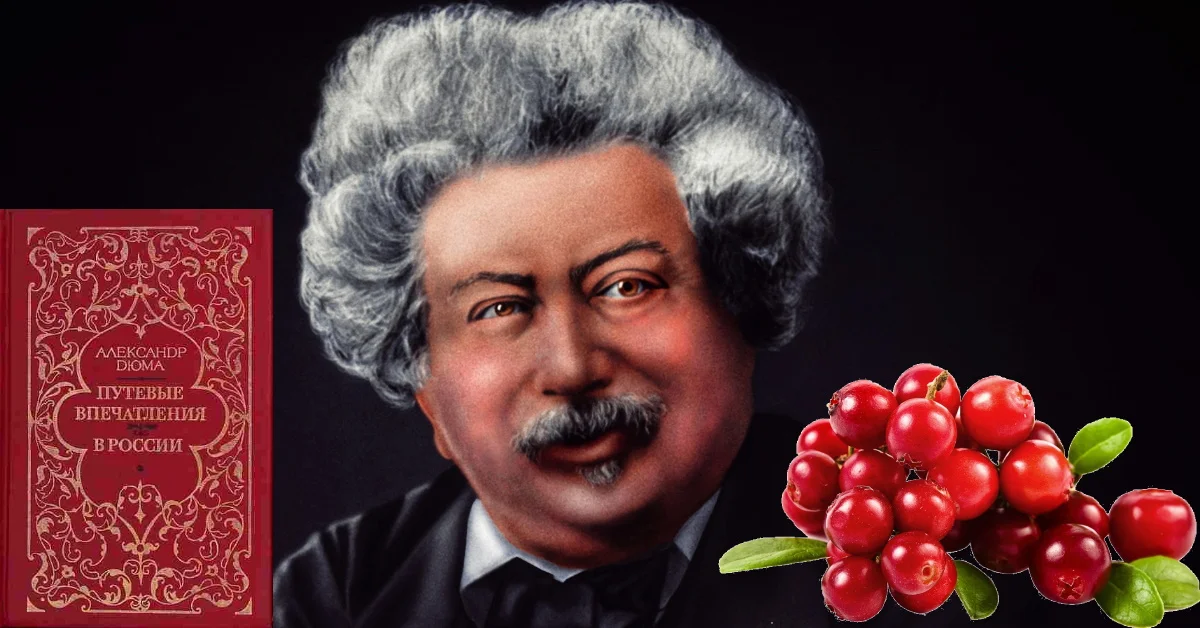According to many sources, the idiom denoting absurd inventions appeared after the famous French writer seriously mentioned a similar plant in his notes about Russia. We checked if this is true.
That's it reports about this phraseological unit “Explanatory Dictionary in four volumes” edited by D. N. Ushakov: “Spreading cranberry is a comic designation for fables, improbabilities that reveal complete unfamiliarity with the subject [came from a description of Russia, in which a superficial French author writes that he was sitting “under the shadow of a majestic cranberry” - sur l'ombre d'un kliukva majestieux].”
Exactly the same explanation for the phrase is given in the “Phraseological Dictionary of the Russian Language” (2014) edited by T. Volkova. But in the one published in the same year "Pocket phraseological dictionary" The identity of the mysterious Frenchman has been declassified: “A. After traveling around Russia, Dumas mentioned in his notes that he sat and drank tea from a samovar “under the shade of spreading cranberries.” The book found its way to Russia, and this expression became a symbol of an absurd invention.” Dumas is mentioned as the author of the idiom in many other sources - for example, in books "History of Russia with polka dots", "Post-Soviet literature and the aesthetics of transculturation" and in an article by writer Dmitry Bykov "Dumas like a father".
Of course, in Europe in the 19th century they periodically encountered the word klukva, which was funny to Western ears. For example, it is mentioned in the 24-volume Encyclopaedia Londinensis (1823), published in Great Britain. And in 1860, a posthumous collection of works by Sofia Svechina, the former maid of honor of Empress Maria Feodorovna, who spent most of her life in the capital of France, was published in Paris. This French-language publication also includes a collection of aphorisms called "Snow cranberry" (Klukva podsnejnaia). Around the same time, they began to be published in parts travel impressions Alexandre Dumas from his trip through the Russian Empire in 1858–1859. However, you won’t find anything about “spreading cranberries” in them. Traces of this expression lead to Russia.
In the issue of Moskovskie Vedomosti dated November 16, 1871, editor Mikhail Katkov turned to an article about Moscow published in the Parisian weekly L’Illustration. In it, the Cathedral of Christ the Savior, unfinished at that time, which had nothing to do with the Kremlin, was called “the oldest of the religious monuments built in the Kremlin fence.” This blunder Katkov commented with a caustic phrase: “We smelled of those blissful times when a French tourist told how he sat in Russia à l’ombre d’une klukva... (“under the canopy of the cranberries.” - Author’s note.].” This is the earliest known mention of the expression, and Katkov could refer to both a story well known to the public and an incident from personal experience.
A little time passed, and cranberries began to be indirectly associated with Dumas the Father. Thus, Mikhail Saltykov-Shchedrin in his “Pompadours and Pompadours” (1873) writesthat chance brought him “to the prince de la Klioukwa” (le prince de la Klioukwa). In Saltykov’s words one can discern a parody of pseudo-Russian names and surnames (for example, Veal and Telega), with which Dumas the Father in his travel essays caused laughter among a large number of Russian readers.
Finally, in 1879, Alexander Pavlovich Lopukhin, the future professor of the St. Petersburg Theological Academy and publisher of the Orthodox Theological Encyclopedia, arrived from St. Petersburg to New York. In the English-language Journal of the Orthodox Church he posted review on the latest book by British journalist Grenville Murray “Russia Today”. Lopukhin tore the book to smithereens, comparing it with essays by Dumas the Father, which allegedly stated that Russian villagers on hot summer days like to cool off “in the shade of a secular klukva tree.”
In 1894, in the Parisian magazine “Guide for the Curious” stated, that the curious phrase about “the majestic tree called the cranberry” (l’arbre majestueux nommé klukwa) was used in his book by another famous French author of travel notes about Russia, Astolphe de Custine. However, in his work "Russia in 1839" there is no such passage.
As we can see, in the first decades of its existence, the “cranberry” was not yet “spreading” - at best, “majestic”, and the expression was quoted mainly in French, albeit with the same ironic context. However, already at the beginning of the 20th century, the Russian expression acquired its modern form. In 1907, in the magazine “Scales” one could read: “Russia used to be famous abroad as a country where, under the shade of spreading cranberries, peasants drink a drink called a samovar,” in 1908 in “New Time” - “The result was that spreading cranberry, under the cool shade of which the French novelists of the good old days loved to contemplate the Russian man resting behind a samovar at midday heat,” and in the magazine “Modern World” in the same year - “The result was that spreading cranberry, under the cool canopy of which the French novelists of the good old days loved to contemplate the Russian man relaxing at the samovar in the midday heat.” Finally, in 1910, Boris Geyer’s play was staged at the St. Petersburg parody theater “Crooked Mirror.” "Love of a Russian Cossack", in which the girl Aksenka recalled with tears how she sat with her beloved Ivan “under the spreading branches of a hundred-year-old cranberry.” Soon a girl named Masha became the heroine of a parody French-language verse, clearly written under the impression of the mentioned sketch, and, judging by the language errors, the verse was born in Russia.
And by the beginning of the 1920s, the phraseological unit had become mega-popular: the idiom used and Leon Trotsky, and Andrei Bely, and a speaker at the XXII Congress of the CPSU, and editor of the publication of correspondence between Emperor Nicholas II and Kaiser Wilhelm II.
From all of the above it follows that the expression “spreading cranberries” goes back to either an anecdote or a real incident of the mid-19th century, but it has nothing to do with the author of “The Three Musketeers”.
Incorrect quote attribution
Read on topic:
1. Grozny, cranberry and glass of samovar
If you find a spelling or grammatical error, please let us know by highlighting the error text and clicking Ctrl+Enter.






